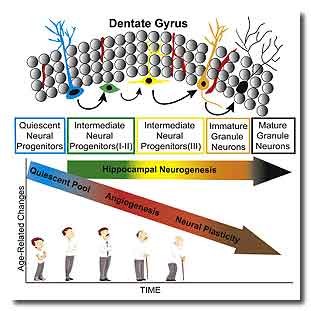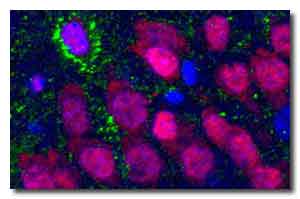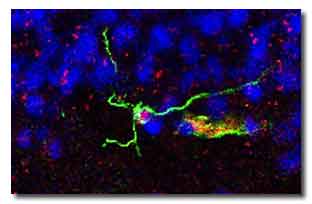|
Researchers at Columbia University Vagelos College
of Physicians and Surgeons show for the first time
that healthy older men and women can generate just
as many new brain cells as younger people.
But new neurons in older brains may make fewer
connections.

Scientists present the most definitive evidence to
date that the human brain makes new neurons
throughout life.
There has been controversy over whether adult humans
grow new neurons, and some research has previously
suggested that the adult brain was hard-wired and
that adults did not grow new neurons.
Lead author Maura Boldrini, associate professor of
neurobiology at Columbia University, says the
findings may suggest that many senior citizens
remain more cognitively and emotionally intact than
commonly believed.
"We found that older people have similar ability to
make thousands of hippocampal new neurons from
progenitor cells as younger people do," Boldrini
says.
"We also found equivalent volumes of the hippocampus
(a brain structure used for emotion and cognition)
across ages.
Nevertheless, older individuals had less
vascularization and maybe less ability of new
neurons to make connections."

IMAGE - A newborn neuron (upper left) in the
brain of an older adult. Image: Maura Boldrini /
Columbia University Vagelos College of Physicians
and Surgeons.
The researchers autopsied hippocampi from 28
previously healthy individuals aged 14-79 who had
died suddenly.
This is the first time researchers looked at newly
formed neurons and the state of blood vessels within
the entire human hippocampus soon after death.
The researchers had determined that study subjects
were not cognitively impaired and had not suffered
from depression or taken antidepressants, which
Boldrini and colleagues had previously found could
impact the production of new brain cells.
In rodents and primates, the ability to generate new
hippocampal cells declines with age.
Waning production of neurons and an overall
shrinking of the dentate gyrus, part of the
hippocampus thought to help form new episodic
memories, was believed to occur in aging humans as
well.

IMAGE - A neural stem cell in the brain. Image:
Maura Boldrini / Columbia University Vagelos College
of Physicians and Surgeons.
The researchers from Columbia University and New
York State Psychiatric Institute found that even the
oldest brains they studied produced new brain cells.
"We found similar numbers of intermediate neural
progenitors and thousands of immature neurons," they
wrote.
Nevertheless, older individuals form fewer new blood
vessels within brain structures and possess a
smaller pool of progenitor cells-descendants of stem
cells that are more constrained in their capacity to
differentiate and self-renew.
The results point to a new model of brain aging, in
which older brains retain the ability to make new
neurons but may become less able to form new
connections between them and keep them supplied with
oxygen.
“It is possible that the changes we see in the older
brains are related to some cognitive-emotional
changes that occur with aging,” Boldrini said, “and
exercise, diet, and medications may help, but future
studies are needed to investigate these ideas.”
For more information
Cell Stem Cell
Human Hippocampal Neurogenesis Persists Throughout
Aging
Maura Boldrini, Camille A. Fulmore, Alexandria N.
Tartt, Laika R. Simeon, Ina Pavlova, Verica Poposka,
Gorazd B. Rosoklija, Aleksandar Stankov, Victoria
Arango, Andrew J. Dwork, René Hen, J. John Mann.
Link...
MDN |